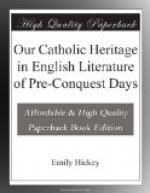CHAPTER V
King Alfred, first layman to be a great power in literature; man of action; of thought; of endurance. Freedom first great possession; afterwards learning and culture. Alfred a loyal Son of the Church. Founder of English prose. Earliest literature of a nation in verse; why. Influence of Rome on Alfred.
“Let us praise the men of renown,” says Holy Scripture (Ecclesiasticus, 44), “and our fathers in their generations.... Such as have borne rule in their dominions, men of great power and endued with their wisdom ... ruling over the present people, and by the strength of wisdom instructing the people in most holy words.”
We have to think now of a man of renown who bore rule in his dominions; a man of great power, and endued with wisdom; who by strength and wisdom instructed his people in most holy words. We have hitherto spoken of work done in the dedicated life of religion: to-day we direct our attention to the work of a great layman; the first English layman whom we know to have been a great power in literature; less as a “maker,” poet or proseman, than as an opener out to “makers” of precious store; a helper and encourager; a fellow-student; a learner and a teacher of whom it could be said, as Chaucer says of his Clerk of Oxford, “gladly would he learn and gladly teach.”
[Illustration: STATUE OF KING ALFRED, BY H. THORNEYCROFT, R.A. [Page 48]
It would not, I think, be possible for English people to over-estimate the value of the gift God gave them in KING AELFRED. That is really the right way to spell his name, but as to most people it looks unfamiliar, we will adopt the more usual spelling and write of him as Alfred.
We think of him in various aspects: first as the strong, brave man who did so much toward making noble history for time to come, by his own action, guided by his piety and devotion. His earliest work was to fight for the gaining of freedom and unity for his people, and this work went over many years. When there was an interval of peace, and when a more settled peace had been won, he worked hard to gain for them the freedom of the mind which can never exist where ignorance is reigning. Freedom is the first great possession; afterwards we seek for learning and culture. People who may be called away at any moment to fight for life or liberty cannot do much in the way of quiet study; and while the Danes were not yet finally repulsed or bound by treaty, the great work of Alfred in civilizing England had to remain in suspense.
We love to think that Alfred’s wars were not to greaten himself, but to set his country free. Then, as later on, if I may quote what I have elsewhere said, the English
Had fought for their God-given birthright,
their country to have and to hold,
And not for the lust of conquest,
and not for the hunger of gold.
There is another aspect in which we may look at this great King; we think of him not only as a doer but as a sufferer; and not only as an endurer of disappointment, a bearer of toil, difficulty, trouble, but as one who bore in his body a “white martyrdom” of great pain, perhaps even anguish; and this for some twenty years.




